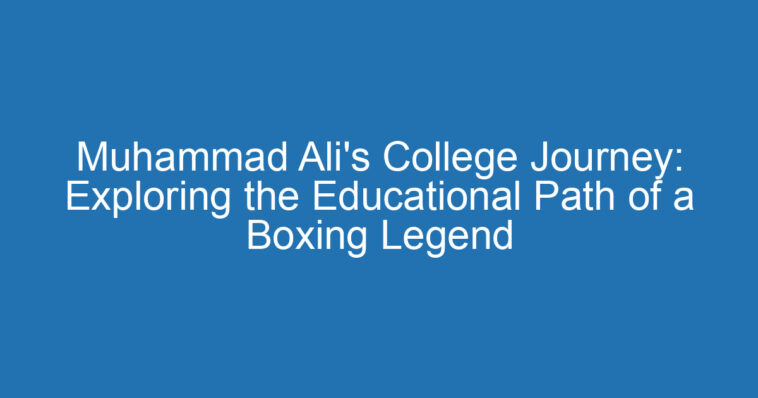Who is Muhammad Ali, and Where Did He Attend College?
Muhammad Ali, the boxing legend who floated like a butterfly and stung like a bee, remains iconic in sports and beyond. Born on January 17, 1942, in Louisville, Kentucky, Muhammad Ali’s remarkable career in the boxing ring is well-documented. However, his educational journey, although less celebrated, is essential to his life story. In this article, we will delve into the colleges and universities that played a role in shaping Muhammad Ali’s early years.
Educational Path of Muhammad Ali:

1. Central High School, Louisville:
Muhammad Ali’s educational journey began at Central High School in Louisville, Kentucky. During his time there, he displayed a boxing talent that would later define his career. While he showed academic promise, his passion for boxing was evident from a young age.
2. Columbia Gym, Louisville:
Although not a traditional college, the Columbia Gym in Louisville played a crucial role in Muhammad Ali’s early education in the art of boxing. Here, he began training under the guidance of Joe Martin, a local police officer and boxing coach. This pivotal experience set him on the path to becoming a boxing legend.
3.No Formal College Education:
Unlike many athletes who pursue higher education alongside their sports careers, Muhammad Ali did not attend a traditional college or university. His dedication to boxing and his rapid rise in the sport led him to forego a formal college education.
Muhammad Ali’s Impactful Career:

Muhammad Ali’s decision to focus solely on his boxing career proved to be wise, as he went on to achieve unprecedented success in the world of sports. His accomplishments include:
– World Heavyweight Champion: Muhammad Ali became the World Heavyweight Champion at 22 by defeating Sonny Liston, making him the youngest boxer to claim this title.
– Olympic Gold Medalist: Before turning professional, Ali won a gold medal in boxing at the 1960 Rome Olympics, showcasing his exceptional talent on the international stage.
– Iconic Boxing Matches: Ali’s legendary fights against opponents like Joe Frazier, George Foreman, and Ken Norton are etched in the annals of boxing history.
– Social and Political Activism: Beyond boxing, Muhammad Ali was known for his activism and willingness to stand up for his beliefs, including his refusal to be drafted into the Vietnam War.
– Humanitarian Efforts: Ali’s philanthropic work and contributions to humanitarian causes left a lasting legacy, demonstrating his commitment to improving the world.
Frequently Asked Questions (FAQ):

1. Did Muhammad Ali attend college or university?
No, Muhammad Ali did not attend a traditional college or university. His dedication to boxing and early success in the sport led him to forgo formal higher education.
2. What was Muhammad Ali’s most famous boxing match?
Muhammad Ali’s most famous boxing match is often considered the “Fight of the Century” against Joe Frazier in 1971. This bout was the first of their three epic battles and remains a historic moment in boxing history.
3. What impact did Muhammad Ali have outside of boxing?
Muhammad Ali’s impact extended beyond the boxing ring. He was a prominent figure in the civil rights and anti-war movements of the 1960s and 1970s. His advocacy for social justice and humanitarian efforts left a lasting legacy.
While brief, Muhammad Ali’s educational journey played a vital role in shaping his remarkable life. His decision to pursue a career in boxing rather than a traditional college education led to a legacy that transcends sports and inspires generations worldwide.




